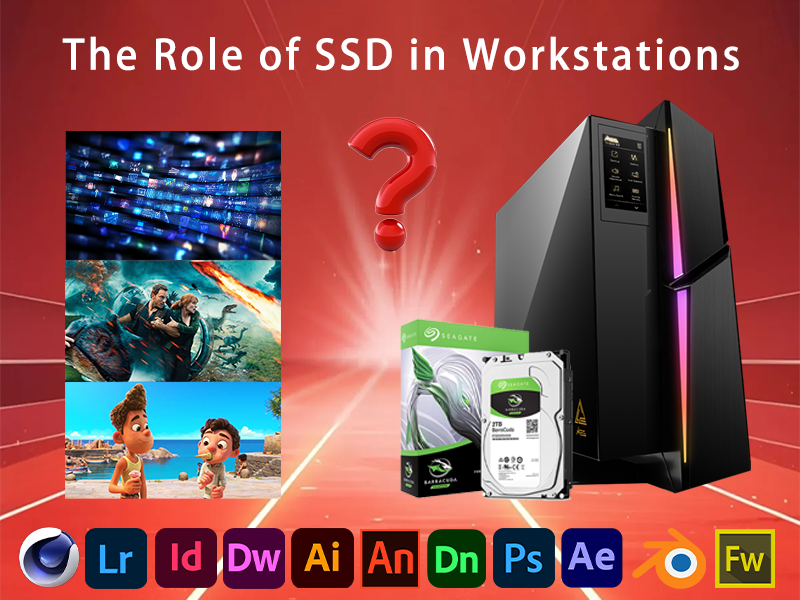I dagens värld har varje modern arbetsstation utrustats med Solid State Drives (SSD). De är en avgörande del av alla arbetsuppsättningar eftersom de kan komma åt data mycket snabbare, generellt sett är mer pålitliga och förbrukar mindre energi än traditionella hårddiskar.
Hastighet och prestanda
En stor fördel med SSD är hur snabbt de fungerar jämfört med traditionella hårddiskar. Traditionella hårddiskar snurrar för att hitta data, medan SSD:ar använder flashminne istället. Skillnaden spelar roll när det gäller att snabbt få saker och ting gjorda. Datorer startar snabbare, program laddas in på sekunder istället för minuter, och åtkomst till dokument eller andra filer sker nästan omedelbart. Den här prestandahöjningen märks särskilt av personer som arbetar med tunga program. Tänk på personer som kör stora databaser, redigerar videor, arbetar med komplexa 3D-modeller eller hanterar stora mängder data dag ut och dag in. För dessa yrkespersoner är övergång till SSD-lagring inte bara en bekvämlighet utan snarare en nödvändighet för att upprätthålla en smidig och produktiv arbetsflöde.
Pålitlighet och hållbarhet
Moderna bärbara datorer och stationära datorer är beroende av trådlösa delsystem som Bluetooth, även om signalkraften tenderar att minska efter cirka 10 meter. Dessa system erbjuder mer än bara bekvämlighet – de ökar också mobiliteten avsevärt. Vi är inte längre fast med klumpiga maskiner som upptar hela skrivborden. Dagens bärbara datorer är mycket lättare än sina föregångare, vilket möjliggör riktigt portabel datahantering. Tillsatsen av fristående termiska plattor har gjort en märkbar skillnad för användarkomfort under längre användningssessioner. När globala temperaturer fortsätter att stiga spelar detta ännu större roll, eftersom överhettning blir mindre av ett problem när man använder enheter i oväntade vinklar. CMOS-batterier håller nu betydligt längre utan att felaktigt sluta fungera, vilket gör våra elektronikprylar mycket mer pålitliga på lång sikt. Och låt oss inte glömma dedupliceringsteknologin heller – denna innovation minskar kostnaderna avsevärt genom att eliminera onödiga dubbelköp inom stora organisationer.
Energieffektivitet
När det gäller energieffektivitet slår SSD:ar definitivt äldre lagringsalternativ dessa dagar. De drar helt enkelt inte upp lika mycket energi som deras föregångare gjorde, så företag spar faktiskt pengar på sina elräkningar samtidigt som de minskar de irriterande koldioxidutslappen. För företag som vill bli gröna utan att gå på överkurs gör detta en stor skillnad. Dessutom håller datorer som kör på SSD:ar sig mycket kyligare under drift och går nästan tyst i jämförelse med bullriga HDD:ar. Alla som har arbetat nära skramlande servrar förstår hur stor lättnad det är att äntligen få lite tystnad på kontoret.
Kostnadsöverväganden
Förr i tiden kostade SSD:ar betydligt mer per gigabyte jämfört med traditionella HDD:ar, men saker och ting har förändrats ganska mycket på sistone. Klyftan mellan deras priser minskar hela tiden. Med bättre tillverkningsmetoder och snabb teknisk utveckling ser vi att SSD:ar blir överkomliga även för personer som arbetar med tajta budgetar idag. Företag som tänker framåt känner till vad som kommer härnäst också. Även om den inledande kostnaden fortfarande kan kännas lite smärtsam, så drar de som investerar nu nytta av snabbare drift och färre systemkrascher. En sådan pålitlighet ger stor avkastning när det mest betyder för verksamhetens fortsättning.
Tekniska Innovationer inom Framtidslagring av Data
Allt fler arbetstagare inser dessa dagar vad som gör SSD:ar så bra för deras arbete, vilket förklarar varför de dyker upp på fler kontorsbord. Teknikvärlden utvecklar också nytt, till exempel NVMe-enheter som lovar snabbare hastigheter än någonsin tidigare. Dessa nyare modeller fungerar utmärkt med moderna datorer och arbetsstationer där snabbhet är avgörande. Med den mängd data vi hanterar idag och hur viktigt det blivit att spara tid, är det tydligt att SSD:ar inte bara är här för att stanna utan faktiskt bidrar till att forma den framtida dator-tekniken. Företag som ännu inte gjort byte kan upptäcka att de hamnar efter konkurrenter som redan litar på lagringslösningar med solid state-teknik.
I slutändan har SSD-tekniken dykt upp tillsammans med andra uppgraderingar som kräver moderna arbetsstationer utöver bara utveckling av periferihjul. Att maximera energieffektiviteten med enheter som batterier samtidigt som man ger pålitlighet under uppgiftsutövning gör arbetsstationerna multifunktionella, vilket underlättar många dagliga uppgifter som professionella står inför.




